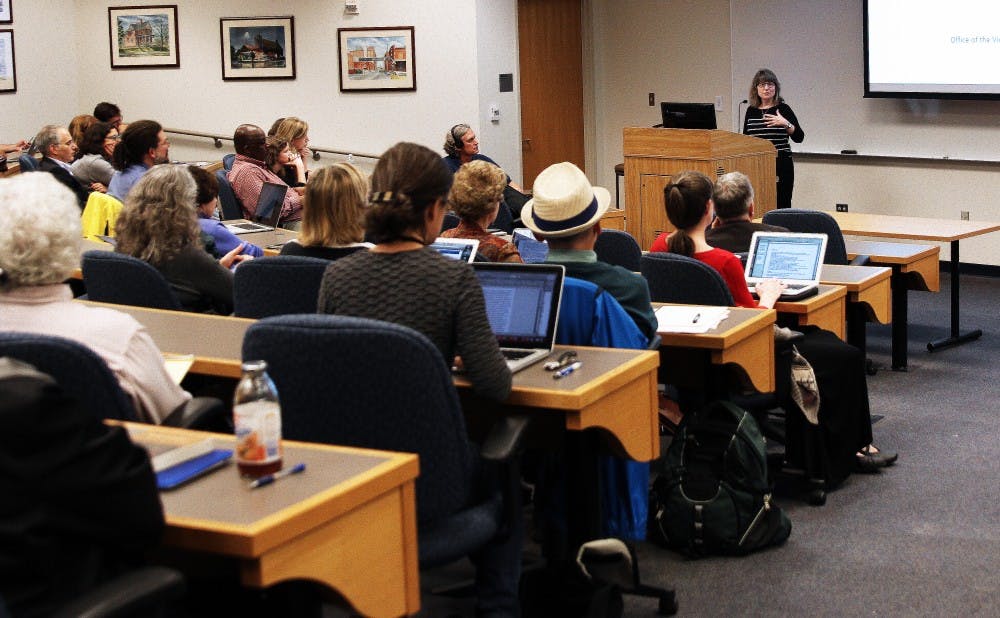Nearly a week after students raised concerns about inclusion at a community forum, the Academic Council discussed initiatives to improve faculty diversity Thursday.
In the council's third meeting of the academic year, Emily Klein, professor of earth sciences at the Nicholas School of the Environment, provided updates on the Diversity Task Force of the Academic Council and the establishment of the Faculty Diversity Task Force Implementation Committee—two initiatives aimed at improving inclusion and representation among Duke faculty. As part of the new committee, Provost Sally Kornbluth has begun the search for a vice provost for faculty advancement. Faculty questioned different aspects of the committee's goals, expressing concerns about the many considerations that go into hiring faculty and integrating faculty at an institutional level.
“Respect, safety, inclusion and community are not present for everyone as evidenced by the conversation this past Friday in Page Auditorium,” Kornbluth said. “It is so critical that we create a welcoming and open community at Duke.”
Nan Jokerst, council chair and J. A. Jones distinguished professor of electrical and computer engineering, explained that the committee was established as a result of an assessment of faculty diversity and inclusion by the DTF last May.
“[The assessment] concluded that we would continue to focus on underrepresented minorities and female faculty but also expand to include a focus on LGBTQ faculty,” Klein said. “We consider and support the idea that a diverse faculty also includes other attributes and are willing to extend into the future, looking at ideological and political diversity, religious background and ethnic origin.”
Klein said that one goal of the newly formed committee is to establish the position of vice provost for faculty advancement, a position she explained would provide intellectual leadership, guidance and oversight of University programs to enhance faculty excellence and promote faculty inclusion and diversity.
Joel Meyer, associate professor of environmental toxicology at the Nicholas School for the Environment, asked Klein how the committee would be able to gauge the effectiveness of new initiatives led by the DTF, and also suggested involving students to show the University’s commitment to diversity.
“Part of the vice provost for faculty advancement’s role is to make sure that plans are actually being executed,” Kornbluth said. “Obviously, there are reasons why a [faculty hiring search] fails or doesn’t work, but easy answers are not going to be acceptable.”
Joshua Sosin, associate professor of classical studies, stressed that the committee’s goals should remain broad rather than limiting its efforts to faculty hiring.
“I speak for a lot of people when I say that we need to be sure that this is on our minds in every aspect of what we do,” he said. "In designing and implementing the curriculum, in recruiting undergraduate and graduate students, in creating a community that is safe and inclusive for the students, in recruiting faculty...this has to be central to our thinking and not something that emerges at the special moments such as hiring.”
In other business:
Jokerst announced a revision to the Duke Faculty Handbook that gives faculty members a greater say in the search and review processes for the hiring of upper administrative positions.
Kornbluth and Edward Balleisen, vice provost for interdisciplinary studies, proposed a more clear process for converting a University-wide interdisciplinary center or initiative to an institute. Faculty responded with concerns about the blurring of lines between departments and institutes.
The Council approved a new international master’s degree in environmental policy hosted at Duke Kunshan University.
Get The Chronicle straight to your inbox
Signup for our weekly newsletter. Cancel at any time.

